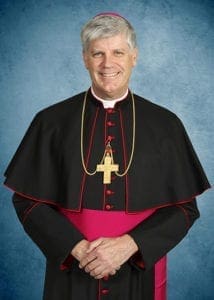‘They all ate and were satisfied’
Published May 27, 2021 | En Español
It is easy to postpone the deepening of one’s personal relationship with Christ for the sake of spending more time problem solving. In my pastoral ministry as a bishop, I often feel tempted to become a manager of crises rather than a man of faith.

Bishop Bernard E. Shlesinger III
Analogous to the Apostles’ experience of the storm at sea, my role as a bishop is not limited to problem solving. There is someone in my boat who has power over life and death and remains ever present in the tabernacle.
As the Catechism says, when we begin to pray “a thousand labors or cares thought to be urgent vie for priority; once again, it is the moment of truth for the heart: what is its real love?” Where is our faith today in the love of Christ found in the Eucharist? The church is experiencing a crisis of eucharistic faith. We can hunger for many things and strive for fulfillment in various activities that in the end leave us without lasting joy.
Pope Francis writes: “I can say that the most beautiful and natural expressions of joy which I have seen in my life were in poor people who had little to hold on to. I also think of the real joy shown by others who, even amid pressing professional obligations, were able to preserve, in detachment and simplicity, a heart full of faith. In their own way, all these instances of joy flow from the infinite love of God, who has revealed himself to us in Jesus Christ.”
Without a proper focus on the presence of Christ in the Eucharist, Christians may seek heaven only as a destination without seeking the grace through him to get us there. Jesus preaches quite poignantly, “Unless you eat my body and drink my blood you have no life within you.”
Sadly, for many Catholics receiving the Eucharist is becoming more of a ritual and the hunger for Holy Communion is no longer felt. Belief in the Real Presence, which is neither imaginary or symbolic, may no longer remain an essential tenet of their Catholic faith. Many simply choose to live on the pragmatic level and conclude that five loaves and two fish could never feed 5,000 men nor satisfy their deeper longing for the fullness of life in Christ.
The first Christians after Pentecost did not focus on some dream of prosperity, fame or euphoria due to a drug. Their focus was not on the temporal but on the eternal, and even the second coming of Christ was something to be anticipated in joyful hope. The Holy Spirit thrust them into a world that was unwelcoming and resistant but their belief in the eucharistic Christ remained the source of their strength as they experienced Christ with them.
Today, more than ever, we need a eucharistic renewal, which is called for by the church and promoted by our archbishop. We need to hunger for food that does not perish but is the body and blood of Christ. It is this food—which is the true food—that will bring us fulfillment and lasting joy.
As we venture away from a pandemic, let us meditate on how Jesus desires to love us, share with us his very self and fill our hearts so that we can eat and be satisfied in him.